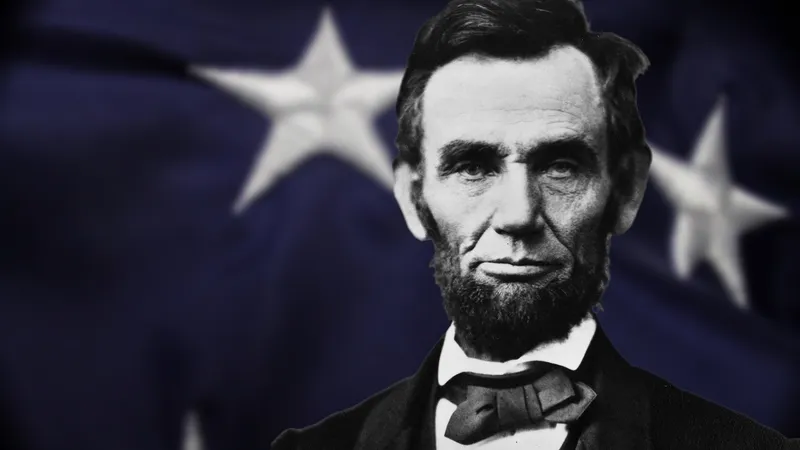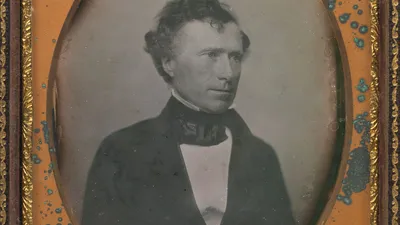
From Log Cabin to White House: The Life of Abraham Lincoln
mashupch
- 0
mashupch.com – Abraham Lincoln, the 16th president of the United States, rose from humble beginnings to become one of the most revered figures in American history. His journey from a log cabin in Kentucky to the White House in Washington, D.C., is not just a tale of personal triumph, but also a reflection of the American Dream itself. Lincoln’s life was marked by struggle, perseverance, and an unwavering commitment to justice, which ultimately led him to save the Union and abolish slavery during the most tumultuous period in U.S. history. This article explores the remarkable journey of Abraham Lincoln, from his childhood in the frontier to his presidency and enduring legacy.
Early Life in a Log Cabin
A Humble Beginning
Abraham Lincoln was born on February 12, 1809, in a log cabin in Hardin County, Kentucky (now LaRue County). His parents, Thomas Lincoln and Nancy Hanks Lincoln, were poor farmers, and the family’s life was one of hardship from the outset. The Lincolns moved several times in Lincoln’s early years, seeking better opportunities. The family eventually settled in Spencer County, Indiana, when Lincoln was around 7 years old.
Growing up in a frontier environment, Lincoln’s family struggled with poverty. His father, though hardworking, was often in debt, and the family lacked the resources to offer Lincoln the kind of formal education enjoyed by wealthier children. Yet, despite these circumstances, Lincoln had a burning desire to learn.
The Self-Taught Student
Lincoln’s formal education was limited, consisting of only about a year of schooling. However, he was an avid reader and taught himself by borrowing books from neighbors and friends. He studied a variety of subjects, including the Bible, the works of Shakespeare, and other texts on history and law. His thirst for knowledge and self-improvement became a defining characteristic throughout his life.
Despite his limited schooling, Lincoln’s intelligence, wit, and deep moral convictions were apparent. In his youth, he became known for his storytelling and was often asked to read aloud from books he had borrowed, impressing those who heard him. Lincoln’s intellectual curiosity, combined with his natural ability to communicate, would later help him rise to prominence in the political world.
The Path to Leadership
Early Career and the Law
By the age of 19, Lincoln moved to New Salem, Illinois, where he worked a variety of jobs, including rail-splitter, clerk, and storekeeper. It was in New Salem that Lincoln began to make a name for himself in local politics. He served as a member of the Illinois State Legislature as a representative for the Whig Party, winning the seat in 1834.
While in New Salem, Lincoln’s interest in law grew, and in 1836, he passed the bar exam and became a practicing attorney. Lincoln’s legal career began to flourish, and he built a reputation as an honest and capable lawyer. His ability to engage juries with his powerful speeches and logical arguments made him highly respected in the legal community.
Political Ambitions and the Illinois Senate Race
In addition to his law career, Lincoln was drawn to politics. He was elected to the Illinois State Legislature in 1834 and served multiple terms in the years that followed. In the 1840s, Lincoln moved into national politics, running for the U.S. House of Representatives in 1846. He was elected to Congress as a member of the Whig Party, and his time in Washington further shaped his political views.
During the 1850s, the issue of slavery began to dominate the American political landscape, and Lincoln became increasingly vocal in his opposition to its expansion into new territories. The issue of slavery deeply troubled Lincoln, and in 1854, he returned to politics to oppose the Kansas-Nebraska Act, a law that allowed settlers in new territories to decide for themselves whether or not to allow slavery. Lincoln’s opposition to the Act reignited his political career and laid the groundwork for his later presidential aspirations.
The Lincoln-Douglas Debates
In 1858, Lincoln ran for the U.S. Senate against the incumbent Stephen A. Douglas, a leading proponent of popular sovereignty — the idea that each state should decide for itself whether to permit slavery. The two men engaged in a series of debates across Illinois, known as the Lincoln-Douglas Debates, which became a pivotal moment in American history.
Although Lincoln ultimately lost the Senate race, the debates brought him national attention. His articulate opposition to the expansion of slavery, combined with his argument that the nation could not endure “half slave and half free,” earned him widespread recognition. Lincoln’s moral clarity and eloquence during these debates positioned him as a rising star in the anti-slavery movement.
The Presidency: A Nation Divided
The Election of 1860
In 1860, Lincoln became the Republican Party’s candidate for president. The Republican platform was centered on halting the expansion of slavery into new territories, and Lincoln’s candidacy gained support primarily from Northern states. His victory in the 1860 election was a turning point in American history.
Lincoln’s victory was deeply upsetting to the Southern states, where slavery was entrenched in the economy and social structure. Fearing that Lincoln would take action to abolish slavery, several Southern states seceded from the Union, forming the Confederate States of America. The secession crisis would soon lead to the outbreak of the Civil War.
The Civil War and the Preservation of the Union
The election of Abraham Lincoln sparked a crisis that led directly to the Civil War. The Southern states, determined to preserve slavery, declared their independence and went to war against the Union. Lincoln’s greatest challenge as president was to preserve the Union and win the war while navigating the deeply divisive issue of slavery.
From the beginning of the war in 1861, Lincoln understood that the nation’s survival was at stake. His determination to preserve the Union guided his decisions throughout the conflict. Lincoln faced many challenges during the war, including military setbacks, political opposition, and personal grief, but he remained resolute in his belief that the Union must be preserved at all costs.
Emancipation and the Fight for Freedom
One of the defining moments of Lincoln’s presidency came in 1863, when he issued the Emancipation Proclamation, which declared that all enslaved people in Confederate-controlled territories were to be set free. This bold move transformed the war into a fight not just to preserve the Union, but also to end slavery in America.
While the Emancipation Proclamation did not immediately free all enslaved people, it changed the moral character of the war and shifted the focus of the Union war effort to the abolition of slavery. The proclamation also allowed African Americans to enlist in the Union Army, further strengthening the Northern cause.
The Gettysburg Address
Another significant moment in Lincoln’s presidency came on November 19, 1863, when he delivered the Gettysburg Address. The speech, delivered at the site of the Battle of Gettysburg, was a short but powerful statement on the purpose of the war. Lincoln emphasized that the nation’s fight was not only for political unity but also for the principles of liberty and equality.
His words — “that this nation, under God, shall have a new birth of freedom” — resonated deeply with Americans and are now seen as some of the most enduring words in American political history.
The End of the War and Lincoln’s Assassination
By 1865, the Confederacy was on the verge of collapse, and the Union had all but won the war. However, Lincoln did not live to see the complete victory. On April 14, 1865, just days after General Robert E. Lee’s surrender at Appomattox Court House, Lincoln was tragically assassinated by John Wilkes Booth, a Confederate sympathizer. Lincoln died the following day, and the nation mourned the loss of its beloved leader.
Legacy: The Great Emancipator
Abraham Lincoln’s life is a testament to the power of perseverance and the pursuit of justice. His rise from a log cabin to the White House, his leadership during the Civil War, and his efforts to abolish slavery transformed the United States and left an indelible mark on the world.
Lincoln’s legacy as the “Great Emancipator” endures. Through his leadership, he not only preserved the Union but also paved the way for a new America, one where the ideals of liberty, equality, and freedom would be extended to all people, regardless of race. His story remains a beacon of hope and inspiration, a reminder that the strength of a nation lies not just in its military or political power, but in its moral vision for a just society.
Conclusion
Abraham Lincoln’s life journey — from the rough frontier of Kentucky to the White House — is a remarkable story of resilience, intellect, and moral conviction. His leadership during the Civil War and his efforts to abolish slavery reshaped the United States, ensuring that the nation would emerge stronger, more united, and more committed to the ideals of freedom and equality. Today, Lincoln is celebrated not only for his political achievements but for the principles of justice, democracy, and human dignity that continue to inspire people around the world.


